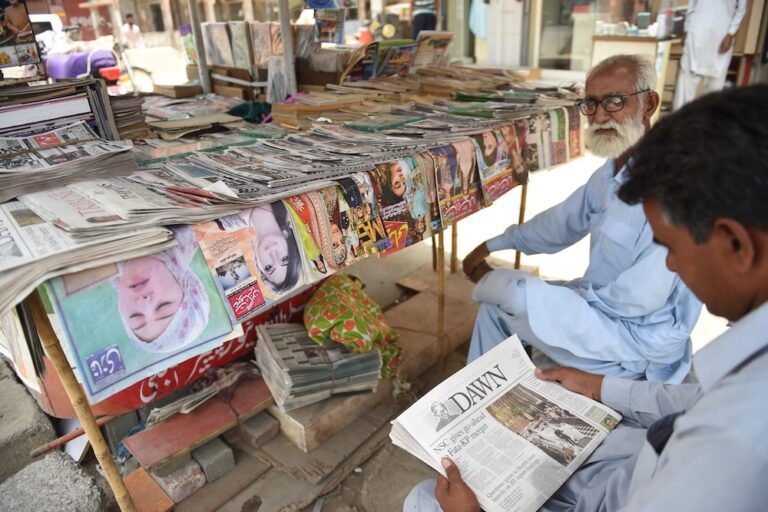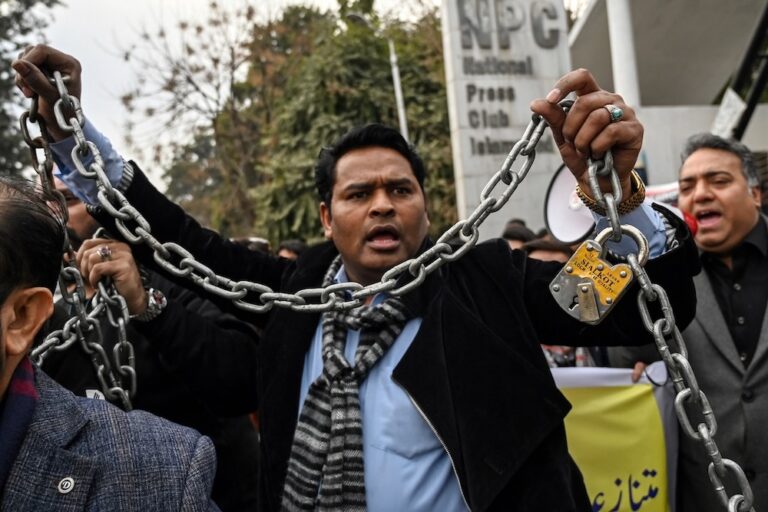Reporters Without Borders (RSF) cautions the army high command against further harassment of the media, which would seriously undermine Pakistani democracy.
This statement was originally published on rsf.org on 13 July 2022.
After registering nine cases of intimidation of Pakistani journalists by army-related agencies since Shehbaz Sharif took over as prime minister in late April, Reporters Without Borders (RSF) cautions the army high command against further harassment of the media, which would seriously undermine Pakistani democracy.
“The many cases of harassment that RSF has registered in the past two months have one thing in common – all the journalists concerned had, in one way or another, criticised the army’s role in Pakistani politics,” said Daniel Bastard, the head of RSF’s Asia-Pacific desk. “It is clear from the data that the armed forces have launched a major campaign to intimidate critical journalists. This kind of interference, which is absolutely intolerable, must stop at once or else the Chief of the Army Staff, Gen. Qamar Javed Bajwa, will be held directly responsible for the decline in press freedom in Pakistan.”
The latest case of violence registered by RSF was on 9 July, when BOL News anchor Sami Ibrahim was attacked by three people outside the TV channel’s studios in Melody, a district in Islamabad, the capital.
In a video posted on his YouTube channel the next day, Ibrahim said they were waiting for him outside the TV channel in order to harass him while filming the scene. They then left in a car with green licence plates, the sign of a state-owned vehicle.
Life imprisonment
The incident comes six weeks after judicial proceedings were opened against Ibrahim under articles 499, 505 and 131 of the penal code, which penalise defamation, statements conducive to public mischief and “abetting mutiny” respectively. The latter charge carries a possible life sentence.
By way of mutiny, Ibrahim simply questioned the internal mechanisms of the Pakistani state apparatus and, in particular, the army’s role in politics. The proceedings were initiated as a result of complaints filed with the police in Attock, a city in Punjab province that is 70 km west of Islamabad.
It was in Attock that another well-known TV journalist, Express News TV anchor Imran Riaz Khan, was intercepted and arrested by a dozen policemen accompanied by members of a Punjab special elite force on the evening of 5 July at a toll plaza on the road to Islamabad, where he had planned to obtain pre-arrest bail to avoid the arrest he knew was imminent if he remained in Punjab.
Khan is the target of at least 17 charges that the Punjab prosecutor’s office has brought against him since May under the prevention of electronic crimes act and several penal code articles – charges that include “hurting the sentiments of the Pakistani people” and “treason.”
Alliances with generals
After many appeals, Khan was finally released on bail on 9 July pending a new hearing scheduled for 19 July. In practice, he faces a range of possible penalties that, in theory, include the death penalty.
In Khan’s case again, the grounds for the complaints were comments he made criticising the current government. On the eve of his arrest, he posted an analysis of his own situation on his YouTube channel in which he referred to threats against him and his family by Gen. Bajwa.
Khan made no secret of his support for Imran Khan, the prime minister ousted on 10 April, and he has often questioned the army’s role in Khan’s ouster and replacement by Sharif as prime minister. It was from his stronghold in Punjab, where he was chief minister for 12 years, that Sharif engineered his takeover and forged alliances within the military, above all with the all-powerful Gen. Bajwa, who also started his career in Punjab.
And it was in the Punjabi capital, Lahore, that Ayaz Amir, another TV journalist, was attacked on the night of 30 June. He was dragged from his car and beaten as he was returning home from recording a programme at his TV channel, Dunya News.
Kingmaker
Significantly, Amir had taken part the previous day in a seminar about the consequences of the recent change of government, openly criticising the army’s influence in Pakistani politics and referring to the generals as “property dealers” because of the way they traffic in government positions. He was equally critical of Imran Khan, who also got to be prime minister with the army’s help.
The army is usually described as the kingmaker behind Pakistani democracy’s trappings. During Imran Khan’s four-year reign as prime minister, RSF repeatedly drew attention to the military’s press freedom violations and attempts to interfere in the media, including harassment of journalists, physical attacks, shooting attacks, kidnappings, threats against journalists living abroad, blocking of broadcast signals and direct censorship of traditional media, video platforms and social media. The list of abuses seems endless.
There has been no let-up in the harassment of journalists since Khan’s replacement by Sharif as prime minister – quite the contrary. Arsalan Khan, an independent commentator who worked for Geo News TV for many years, was kidnapped from his home in the southern city of Karachi on 24 June.
Same modus operandi
Without going into detail, around ten masked men stormed into his home at around 4 a.m. and took him way. After 24 hours, he was finally released by the paramilitary Rangers, who acknowledged having acted because of his supposed relations with “terrorist groups” – relations for which RSF has found no credible evidence.
Aaj News TV journalist Naeem Nazim was kidnapped in broad daylight in Karachi on 13 June by a group of men in civilian dress aboard a truck. After being interrogated for several hours, he was also released at around 4 a.m. the next day. The data was drained from his and his daughter’s mobile phones. The authorities denied any involvement in his abduction but did not investigate it.
Abducting journalists for 24 hours is much used by the Pakistani military intelligence agencies as a method of intimidation. RSF has repeatedly drawn attention in the past to its use, for example, against Express Tribune editor Bilal Farooqui in September 2020, court reporter Matiullah Jan in July 2020, and former freelancer Taha Siddiqui, who narrowly escaped a kidnapping attempt in 2018 and now lives in self-imposed exile.
Criticism of the military – only thing in common
As well as these cases of physical intimidation, RSF has verified four cases of arbitrary complaints against journalists by Pakistan’s spy agencies. ARY News TV anchor Arshad Sharif was charged on 21 May with “spreading hate against the military and the state’s institutions” and received several visits from individuals identifying themselves as members of the Federal Investigation Agency (FIA).
Sabir Shakir, another ARY News journalist, discovered the same day that he was being investigated for allegedly posting “anti-state” comments. He resigned five days later, on 26 May, presumably because he feared reprisals.
Moeed Pirzada, a journalist with British and Pakistani dual nationality working for the 92 News TV channel, received anonymous telephone threats of judicial proceedings at around the same time and on similar grounds.
Jameel Farooqi, the host of TV debates on BOL News, announced in a YouTube video in late May that he was also the target of judicial proceedings. The only thing that these journalists have in common is that, in one form or another, they have questioned the role that the army plays in Pakistani politics.
On 7 July, RSF submitted a number of questions to the office of the spokesman of Inter Services Public Relations (ISPR), the agency that handles communications and relations between the media and all of Pakistan’s armed forces. Although the request was resubmitted on 11 July, no response was received.



